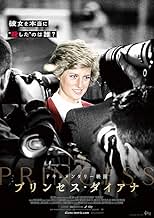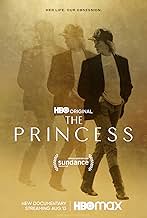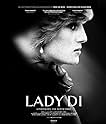IMDb-BEWERTUNG
7,3/10
1632
IHRE BEWERTUNG
Die Geschichte von Prinzessin Diana wird ausschließlich anhand von zeitgenössischem Archivmaterial erzählt, wodurch eine kühne und eindringliche Erzählung über ihr Leben und ihren Tod entste... Alles lesenDie Geschichte von Prinzessin Diana wird ausschließlich anhand von zeitgenössischem Archivmaterial erzählt, wodurch eine kühne und eindringliche Erzählung über ihr Leben und ihren Tod entsteht.Die Geschichte von Prinzessin Diana wird ausschließlich anhand von zeitgenössischem Archivmaterial erzählt, wodurch eine kühne und eindringliche Erzählung über ihr Leben und ihren Tod entsteht.
- Auszeichnungen
- 2 Nominierungen insgesamt
Princess Diana
- Self
- (Archivfilmmaterial)
- (as The Princess)
King Charles III
- Self
- (Archivfilmmaterial)
- (Nicht genannt)
Queen Elizabeth II
- Self
- (Archivfilmmaterial)
- (Nicht genannt)
Martin Bashir
- Self
- (Archivfilmmaterial)
- (Nicht genannt)
Tony Blair
- Self
- (Archivfilmmaterial)
- (Nicht genannt)
Gavin Campbell
- Self
- (Archivfilmmaterial)
- (Nicht genannt)
Lady Colin Campbell
- Self
- (Archivfilmmaterial)
- (Nicht genannt)
Hillary Clinton
- Self
- (Archivfilmmaterial)
- (Nicht genannt)
Jonathan Dimbleby
- Self
- (Archivfilmmaterial)
- (Nicht genannt)
Clint Eastwood
- Self
- (Archivfilmmaterial)
- (Nicht genannt)
Dodi Fayed
- Self
- (Archivfilmmaterial)
- (Nicht genannt)
Sarah Ferguson
- Self
- (Archivfilmmaterial)
- (Nicht genannt)
Robert Kilroy-Silk
- Self
- (Archivfilmmaterial)
- (Nicht genannt)
Henry Kissinger
- Self
- (Archivfilmmaterial)
- (Nicht genannt)
Bernie Levien
- Self
- (Archivfilmmaterial)
- (Nicht genannt)
John Major
- Self
- (Archivfilmmaterial)
- (Nicht genannt)
Nelson Mandela
- Self
- (Archivfilmmaterial)
- (Nicht genannt)
Mother Teresa
- Self
- (Archivfilmmaterial)
- (Nicht genannt)
Empfohlene Bewertungen
Greetings again from the darkness. It's been 25 years since the paparazzi chased the car into that Paris tunnel. The ensuing accident took the lives of Princess Diana, her boyfriend Dodi Al Fayed, and their driver, Henri Paul. The tragic and stunning event led to global grieving for a Princess who many felt never was accepted as a member of the Royal Family. Director Ed Perkins (BLACK SHEET, 2018) uses only archival footage, stills, and news clips to show how the media covered Diana over what was less than two decades in the spotlight. No new interviews - the talking heads we are accustomed to in documentaries - are included here, only the editing of existing media materials are offered as storytelling devices.
The film opens with a tourist-shot video taken just moments before the fatal accident. What stands out is the crush of photographers, the squealing tires takeoff of Diana's car, and the swift action of paparazzi following on scooters and cycles. It's not until the end of the film that we see the footage of the wreckage being towed from the tunnel. The rest of the film tracks Diana over the years ... less than 20 years total.
The flashback takes us to Diana Spencer as a 19-year-old girlfriend of Prince Charles. As the press hound her on the walk to her car, we note her coy and shy demeanor as she offers "no comment" before driving herself away. The strain on her face as she's being questioned is evident, and remains through those early shared interviews with Charles. It's not until years later when she becomes so adept at handling the media frenzy.
Throughout the film we see clips of Prince Charles, Queen Elizabeth, Sarah Ferguson, and Diana's interactions with such notables as Henry Kissinger, Mother Teresa, John Travolta, Luciano Pavarotti, and Nelson Mandela. We watch as Diana's hairstyles make their way around the globe, and of course, the wedding segment recalls how it became 'the' television event of 1981. There are segments on two babies (William and Harry), and we even see Diana holding Harry in her lap as the car drives away ... and Charles heads to his polo match.
The 12-year age gap is discussed, but Diana's surprising BBC interview with Martin Bashear provided the more likely reason for the 1992 separation. Camilla Parker-Bowles is shown while still married, but a Charles interview (along with Diana's BBC interview) make it clear that the Diana marriage was meant to deliver 'pure' bloodlines to the Royal Family, and the "Fred and Gladys" (Charles and Camilla) relationship couldn't do that. We can't help but notice how much sadness Diana carried, and she certainly had her own detractors and critics, especially when biographers noted her own affair. It was this era that turned the Royals into their own entertainment industry - something which is disturbingly even more true today. Diana died at only 36 years of age. Both of her sons are older than that now. The global grief experienced is on full display during the segments highlighting her funeral. Perkins' film might be a bit difficult for anyone who wasn't around during the Diana era, but for those of us who were, the memories have not faded, and are enhanced by what we see here.
Available on HBO and HBO Max beginning August 13, 2022.
The film opens with a tourist-shot video taken just moments before the fatal accident. What stands out is the crush of photographers, the squealing tires takeoff of Diana's car, and the swift action of paparazzi following on scooters and cycles. It's not until the end of the film that we see the footage of the wreckage being towed from the tunnel. The rest of the film tracks Diana over the years ... less than 20 years total.
The flashback takes us to Diana Spencer as a 19-year-old girlfriend of Prince Charles. As the press hound her on the walk to her car, we note her coy and shy demeanor as she offers "no comment" before driving herself away. The strain on her face as she's being questioned is evident, and remains through those early shared interviews with Charles. It's not until years later when she becomes so adept at handling the media frenzy.
Throughout the film we see clips of Prince Charles, Queen Elizabeth, Sarah Ferguson, and Diana's interactions with such notables as Henry Kissinger, Mother Teresa, John Travolta, Luciano Pavarotti, and Nelson Mandela. We watch as Diana's hairstyles make their way around the globe, and of course, the wedding segment recalls how it became 'the' television event of 1981. There are segments on two babies (William and Harry), and we even see Diana holding Harry in her lap as the car drives away ... and Charles heads to his polo match.
The 12-year age gap is discussed, but Diana's surprising BBC interview with Martin Bashear provided the more likely reason for the 1992 separation. Camilla Parker-Bowles is shown while still married, but a Charles interview (along with Diana's BBC interview) make it clear that the Diana marriage was meant to deliver 'pure' bloodlines to the Royal Family, and the "Fred and Gladys" (Charles and Camilla) relationship couldn't do that. We can't help but notice how much sadness Diana carried, and she certainly had her own detractors and critics, especially when biographers noted her own affair. It was this era that turned the Royals into their own entertainment industry - something which is disturbingly even more true today. Diana died at only 36 years of age. Both of her sons are older than that now. The global grief experienced is on full display during the segments highlighting her funeral. Perkins' film might be a bit difficult for anyone who wasn't around during the Diana era, but for those of us who were, the memories have not faded, and are enhanced by what we see here.
Available on HBO and HBO Max beginning August 13, 2022.
This documentary tells, at a pace, the story of Princess Diana through media coverage.
Many phases of Diana's relationship with the media, eg the Bashir interview, are worth a documentary in their own right.
The commentary is unspoken through the editing and music score. It doesn't tell those who lived through the 80s and 90s anything new and it certainly won't be last work on Diana's life.
There has been a lot of work selecting a vast range of archive footage, primarily from the UK and the US, with many hitherto unseen finds.
Most, if not all, of the original source material was shot in 4:3. I question the decision to crop and zoom all of this for widescreen, with a consequent degradation in picture quality. It would have been better to have preserved the original 4:3 aspect ratio.
On the Bashir interview, these are the only clips credited to the source on screen during the documentary. I understand this is because the BBC didn't give clearance for their use (the BBC has actually banned it from being licensed or repeated) and the documentary makers are claiming fair dealing on its use.
Many phases of Diana's relationship with the media, eg the Bashir interview, are worth a documentary in their own right.
The commentary is unspoken through the editing and music score. It doesn't tell those who lived through the 80s and 90s anything new and it certainly won't be last work on Diana's life.
There has been a lot of work selecting a vast range of archive footage, primarily from the UK and the US, with many hitherto unseen finds.
Most, if not all, of the original source material was shot in 4:3. I question the decision to crop and zoom all of this for widescreen, with a consequent degradation in picture quality. It would have been better to have preserved the original 4:3 aspect ratio.
On the Bashir interview, these are the only clips credited to the source on screen during the documentary. I understand this is because the BBC didn't give clearance for their use (the BBC has actually banned it from being licensed or repeated) and the documentary makers are claiming fair dealing on its use.
I watched this only because of the recent death of the queen of England. I was very young when princess Diana cam into the spotlight and all I could remember of her and an adolescent and young adult was her philanthropy and kindness. To me that says it all. I don't believe in the monarchy one bit. I do believe in respecting individuals that leave a positive mark in the world and that is what the princess did. There is no dispute in that. This documentary left me with like the title of my review says my jaw dropped in many instances. Many times I thought to myself of how "cringy" to use a modern term the kids use these days so many things that were done , said and thought of this person for no other reason than for being. Of course no one is perfect and princess Diana certainly was not but she definitely did not deserve a lot of the negative things that were done to her by that family. This documentary showed a lot of that in such a different and interesting way. Very well done in my opinion.
As soon as I saw this had premiered at Sundance, I suspected it would be worth the watch. Why? Because unlike the glut of so-called documentaries about this ill-fated yet fascinating woman--with their dubious research, endless speculation, and onslaught of unverified opinions--this extremely well-made film doesn't tell you what the producers are pretty sure must have happened during Diana's life using a bunch of crap from the public archives that everyone's already seen a zillion times. Instead, it shows you exactly what went on through the use of historical footage and audio--most of which (as a Yank) I've never before seen or heard before. It's meticulously edited to chronologically follow the facts. By doing this, the story becomes so engrossing that there were times I felt swept up in the saga as if I was there and experiencing everything for the first time. That's good filmmaking imho. Totally worth the time investment.
To start, yes there is a lot of low quality clips and much of what you see here has been in previous documentaries, however, it's not exactly possible to improve video quality from thirty years ago so you shouldn't judge it based on today's standards, that's just stupid. As for it "being done before" it's important to note that many docs fall to the wayside over the years and become difficult to track down, so there will always be new editions for every generation so long as Diana stays relevant.
I found this to be an interesting watch. There is no narrative, at least not in a literal sense, but there is an obvious angle to the documentary. Not all the information is presented, some parts of the clips shown are deliberately edited to enhance mood or atmosphere, like painting the prince or princess in a certain light. That being said, it's surprisingly unbiased, there was a lot of uncomfortable dialogue from interviews with citizens or journalists who were for or against Princess Diana. It was quite polarized The worst was the paparazzi. This documentary solidified my assumption that the paparazzi were as bad as everyone made them out be. The way they talked about her was disgusting, like she wasn't even a human being. They harassed her to the point of breaking her spirit. If she resisted them she was called a f---ing b----, if she dared played along and smiled or engaged with them they had the audacity to call her a mediawhore. It's like victim blaming after a rape, and it is extremely uncomfortable to watch.
I was also surprised to see so many people given a platform to speak out against her and say such repulsive things. I guess the bar was set incredibly low for journalistic integrity in the UK in the 80's and 90's. Journalists were given the opportunity to voice pointless, unfounded arguments which often ended up in childish name calling (?!).
The truth was that Diana was an unusual woman. Her humanitarian efforts were commendable, she did more than any of the other Royal family were willing to do at the time. Yes her marriage was on the rocks from the outset. Interviews with Charles have spelled out the truth from the begginning. I don't think he ever truly deceived Diana, but I believe she had trouble accepting and facing the truth and thought, like many women, that she could change him. It was cruel to expect her to just face up and deal with the situation and take it in stride. Blasting her for having mental health crises was just stigmatizing mental illness and it's part and parcel to the incredibly prejudiced attitudes of the time (which sadly still persist to this day). She was not a saint and that is not why people still talk about her to this day, she was representative of a hope for a future that really we will never know.
I recommend this doc but it is difficult at times to watch.
I found this to be an interesting watch. There is no narrative, at least not in a literal sense, but there is an obvious angle to the documentary. Not all the information is presented, some parts of the clips shown are deliberately edited to enhance mood or atmosphere, like painting the prince or princess in a certain light. That being said, it's surprisingly unbiased, there was a lot of uncomfortable dialogue from interviews with citizens or journalists who were for or against Princess Diana. It was quite polarized The worst was the paparazzi. This documentary solidified my assumption that the paparazzi were as bad as everyone made them out be. The way they talked about her was disgusting, like she wasn't even a human being. They harassed her to the point of breaking her spirit. If she resisted them she was called a f---ing b----, if she dared played along and smiled or engaged with them they had the audacity to call her a mediawhore. It's like victim blaming after a rape, and it is extremely uncomfortable to watch.
I was also surprised to see so many people given a platform to speak out against her and say such repulsive things. I guess the bar was set incredibly low for journalistic integrity in the UK in the 80's and 90's. Journalists were given the opportunity to voice pointless, unfounded arguments which often ended up in childish name calling (?!).
The truth was that Diana was an unusual woman. Her humanitarian efforts were commendable, she did more than any of the other Royal family were willing to do at the time. Yes her marriage was on the rocks from the outset. Interviews with Charles have spelled out the truth from the begginning. I don't think he ever truly deceived Diana, but I believe she had trouble accepting and facing the truth and thought, like many women, that she could change him. It was cruel to expect her to just face up and deal with the situation and take it in stride. Blasting her for having mental health crises was just stigmatizing mental illness and it's part and parcel to the incredibly prejudiced attitudes of the time (which sadly still persist to this day). She was not a saint and that is not why people still talk about her to this day, she was representative of a hope for a future that really we will never know.
I recommend this doc but it is difficult at times to watch.
Wusstest du schon
- Zitate
Princess Diana: It is humbling to know that some of you feel that I should be honored in this way.
Top-Auswahl
Melde dich zum Bewerten an und greife auf die Watchlist für personalisierte Empfehlungen zu.
- How long is The Princess?Powered by Alexa
Details
- Erscheinungsdatum
- Herkunftsländer
- Offizieller Standort
- Sprache
- Auch bekannt als
- Diana
- Produktionsfirmen
- Weitere beteiligte Unternehmen bei IMDbPro anzeigen
Box Office
- Weltweiter Bruttoertrag
- 72.453 $
- Laufzeit1 Stunde 49 Minuten
- Farbe
Zu dieser Seite beitragen
Bearbeitung vorschlagen oder fehlenden Inhalt hinzufügen























